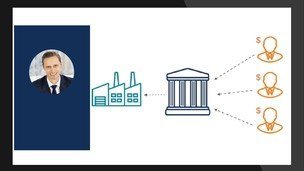M&A, Capital Raising, Capital Markets, Debt Financing, Equity Financing and more
Summary
The provided course on corporate finance, “Corporate Finance 101,” is designed to equip individuals with the fundamental knowledge and skills necessary for a successful career in various sectors of corporate finance, including investment banking, equity research, private equity, corporate development, financial planning and analysis (FP&A), and treasury. The course spans six sections, encompassing 30 lectures with a total duration of 1 hour and 32 minutes. Below is a comprehensive summary of what the course entails and what participants can expect to learn.
Course Objectives and Content
The primary aim of the course is to introduce key concepts and practices within corporate finance. Participants will gain an understanding of:
- Key Players in Capital Markets:
- The course begins by identifying the main participants in the capital markets, including investment banks, institutional investors, retail investors, and regulatory bodies. Understanding these players is crucial as they each play distinct roles in the financial ecosystem.
- Capital Raising Process:
- The course details the stages involved in raising capital, providing an overview of both debt and equity financing options. This includes an explanation of the steps a company takes to secure funding, from preparing financial statements to pitching to investors and negotiating terms.
- Business Valuation Techniques:
- Several valuation methodologies are covered, such as Comparable Company Analysis (Comps), Precedent Transactions, and Discounted Cash Flow (DCF) analysis. These methods help in determining the value of a business or its assets, which is critical for investment decisions and mergers and acquisitions (M&A).
- Types of Valuation Multiples:
- The course explains different valuation multiples like Price-to-Earnings (P/E), Enterprise Value-to-EBITDA (EV/EBITDA), and others. These multiples are used to compare companies within the same industry and assess their relative value.
- Deal Structuring:
- Participants learn about the strategic and financial considerations involved in structuring a deal, whether it’s an acquisition, merger, or investment. This includes understanding terms, conditions, and the financial instruments used.
- Financing Acquisitions:
- The course provides insights into the various methods of financing an acquisition, including debt financing, equity financing, and hybrid instruments. It explains the benefits and drawbacks of each method and how to choose the most suitable one for a given scenario.
- Types of Debt and Equity Securities:
- Different types of debt securities (senior debt, subordinated debt) and equity securities (common shares, preferred shares) are discussed. The course delves into their characteristics, benefits, risks, and the scenarios in which they are typically used.
- Career Paths and Interview Preparation:
- Finally, the course offers guidance on career paths within corporate finance and provides tips for preparing for job interviews. This includes an overview of roles in various sectors and advice on how to stand out during the hiring process.
Target Audience
This course is tailored for:
- University Students: Those studying finance or accounting and seeking to gain a foundational understanding of corporate finance.
- Professionals: Individuals looking to transition into corporate finance from other fields or those seeking to advance their current careers.
- Finance Professionals: Those in need of a refresher on corporate finance principles.
Requirements
Participants are expected to have a basic understanding of finance and accounting principles before enrolling in the course. This foundational knowledge will help them grasp the more advanced concepts discussed in the lectures.
Conclusion
“Corporate Finance 101” serves as a comprehensive introduction to the key aspects of corporate finance. By the end of the course, participants will have a solid understanding of the capital markets, capital raising processes, business valuation techniques, deal structuring, and the types of debt and equity securities. Additionally, they will receive valuable career advice and interview preparation tips, setting them on a path toward a successful career in corporate finance.
What You’ll Learn
- Understand who the key players in the capital markets are
Requirements
-
A basic understanding of finance
-
A basic understanding of accounting
Description
Interested in a career in corporate finance? Looking to move up the ladder at your current job?
This introduction to corporate finance course will give an overview of all the key concepts you need for a high powered career in investment banking, equity research, private equity, corporate development, financial planning & analysis (FP&A), treasury, and much more.
Our Corporate Finance 101 Course will teach you:
- Who the key players in the capital markets are,
- What the capital raising process looks like,
- The main business valuation techniques,
- Types of valuation multiples,
- How to structure a deal,
- How to finance an acquisition,
- Types of debt securities,
- Types of equity securities,
- And an overview of career paths as well as how to prepare for interviews.
Who this course is for
- University students studying finance or accounting
- Professionals looking to move into corporate finance
- Finance professionals looking for a refresher
- Anyone who wants to learn about corporate finance










